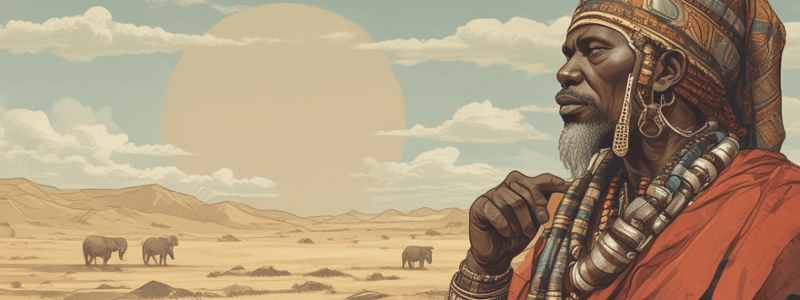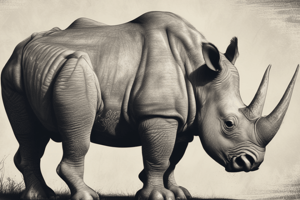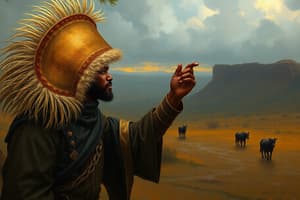Podcast
Questions and Answers
In what year did Somalia gain independence from the UN trusteeship?
In what year did Somalia gain independence from the UN trusteeship?
- 1969
- 1960 (correct)
- 1991
- 1950
What was the name of the newly formed state in 1960?
What was the name of the newly formed state in 1960?
- United Republic of Somalia (correct)
- Republic of Somali Territories
- Federal Republic of Somalia
- Somali Democratic State
What was the message conveyed by Somalia to its neighbors through its national flag?
What was the message conveyed by Somalia to its neighbors through its national flag?
- A message of unity and cooperation
- A message of surrender
- A message of neutrality
- An unequivocal irredentist message (correct)
How many phases of decisional behavior are identified in the conflict between Ethiopia and Somalia?
How many phases of decisional behavior are identified in the conflict between Ethiopia and Somalia?
What was the period of UN trusteeship over former British and Italian Somaliland?
What was the period of UN trusteeship over former British and Italian Somaliland?
Which former French colony was involved in the territorial dispute with Somalia?
Which former French colony was involved in the territorial dispute with Somalia?
During what year did the alignments of the superpowers in the Horn of Africa change?
During what year did the alignments of the superpowers in the Horn of Africa change?
What was a major point of contention in the Ogaden Desert?
What was a major point of contention in the Ogaden Desert?
What was one of the terms demanded of Somalia by Ethiopia and Kenya?
What was one of the terms demanded of Somalia by Ethiopia and Kenya?
What was the name of the conflict between Ethiopia and Somalia in 1977-1978?
What was the name of the conflict between Ethiopia and Somalia in 1977-1978?
What was the primary source of support for Presidents of Somalia?
What was the primary source of support for Presidents of Somalia?
How did Siad Barré retain power in Somalia?
How did Siad Barré retain power in Somalia?
What event occurred in 1977-1978 during Siad Barré's rule?
What event occurred in 1977-1978 during Siad Barré's rule?
Who was restored to his throne in 1941 by the UK?
Who was restored to his throne in 1941 by the UK?
How many phases did Ethiopia's behavior in the conflict have?
How many phases did Ethiopia's behavior in the conflict have?
What did Somalia's constitution proclaim as its goal?
What did Somalia's constitution proclaim as its goal?
What did Ethiopia secure formal approval of in the Organization of African Unity (OAU)?
What did Ethiopia secure formal approval of in the Organization of African Unity (OAU)?
Why did Somalia perceive the military alliance between Ethiopia and Kenya as threatening?
Why did Somalia perceive the military alliance between Ethiopia and Kenya as threatening?
What was the outcome of the agreement between Somalia and Ethiopia a year after their conflict?
What was the outcome of the agreement between Somalia and Ethiopia a year after their conflict?
Why did Somalia join the Arab League?
Why did Somalia join the Arab League?
Djibouti was a former British colony.
Djibouti was a former British colony.
The Ogaden War between Ethiopia and Somalia lasted from 1976 to 1977.
The Ogaden War between Ethiopia and Somalia lasted from 1976 to 1977.
The USA was a patron of Somalia in the 1960s.
The USA was a patron of Somalia in the 1960s.
Ethiopia and Somalia had significant economic relations during their conflict.
Ethiopia and Somalia had significant economic relations during their conflict.
The rulers of Ethiopia and Kenya demanded reparations from Somalia for damage caused by Ethiopia during the Ogaden War.
The rulers of Ethiopia and Kenya demanded reparations from Somalia for damage caused by Ethiopia during the Ogaden War.
Somalia's constitution proclaimed the goal of unification of all ethnic Arab majority territory.
Somalia's constitution proclaimed the goal of unification of all ethnic Arab majority territory.
Ethiopia and Kenya formed a military alliance in 1962.
Ethiopia and Kenya formed a military alliance in 1962.
The Organization of African Unity (OAU) approved the principle of the inviolability of state frontiers at the request of Somalia.
The Organization of African Unity (OAU) approved the principle of the inviolability of state frontiers at the request of Somalia.
Somalia's provision of weapons to neighboring states was authorized by its constitution.
Somalia's provision of weapons to neighboring states was authorized by its constitution.
The demilitarization of the border and resumption of diplomatic relations between Somalia and Ethiopia occurred in 1962.
The demilitarization of the border and resumption of diplomatic relations between Somalia and Ethiopia occurred in 1962.
The Ethiopian-Somalia conflict is a resolved conflict.
The Ethiopian-Somalia conflict is a resolved conflict.
Somalia and Ethiopia formed a united republic in 1960.
Somalia and Ethiopia formed a united republic in 1960.
The Somali national flag features five stars, representing the five territories claimed by Somalia.
The Somali national flag features five stars, representing the five territories claimed by Somalia.
The Ogaden Desert was a major point of contention between Ethiopia and Somalia.
The Ogaden Desert was a major point of contention between Ethiopia and Somalia.
Somalia was a former French colony.
Somalia was a former French colony.
Haile Selassie was restored to his throne by the US in 1941.
Haile Selassie was restored to his throne by the US in 1941.
Siad Barré's clan-based political regime was a viable principal adversary against a more powerful foe during the 1977-1978 war with Ethiopia.
Siad Barré's clan-based political regime was a viable principal adversary against a more powerful foe during the 1977-1978 war with Ethiopia.
The inter-clan political system in Somalia functioned like a presidential system in Western democracies.
The inter-clan political system in Somalia functioned like a presidential system in Western democracies.
Ethiopia's behavior in the conflict with Somalia had only one phase.
Ethiopia's behavior in the conflict with Somalia had only one phase.
Siad Barré retained power in Somalia by weakening his own clan and constructing alliances with competing clans.
Siad Barré retained power in Somalia by weakening his own clan and constructing alliances with competing clans.
What was the primary reason for Somalia's assertion of ownership over five territories in the Horn of Africa?
What was the primary reason for Somalia's assertion of ownership over five territories in the Horn of Africa?
What was the outcome of the United Nations trusteeship over former British and Italian Somaliland?
What was the outcome of the United Nations trusteeship over former British and Italian Somaliland?
How did the Ogaden War between Ethiopia and Somalia affect Somalia?
How did the Ogaden War between Ethiopia and Somalia affect Somalia?
What was the significance of the five-star national flag of Somalia?
What was the significance of the five-star national flag of Somalia?
What was the main characteristic of the Somali political system during the 1977-1978 war with Ethiopia?
What was the main characteristic of the Somali political system during the 1977-1978 war with Ethiopia?
What was the outcome of the agreement between Somalia and Ethiopia a year after their conflict?
What was the outcome of the agreement between Somalia and Ethiopia a year after their conflict?
What was the primary goal proclaimed by Somalia's constitution?
What was the primary goal proclaimed by Somalia's constitution?
What was the purpose of Somalia joining the Arab League?
What was the purpose of Somalia joining the Arab League?
What was the reaction of Ethiopia to Somalia's claims to ethnic-majority territories?
What was the reaction of Ethiopia to Somalia's claims to ethnic-majority territories?
What did Somalia perceive as a threatening act by its 'common enemy'?
What did Somalia perceive as a threatening act by its 'common enemy'?
What territories did Somalia have territorial claims against, according to the East Africa Confrontation?
What territories did Somalia have territorial claims against, according to the East Africa Confrontation?
Which superpower supported Somalia in the 1960s and most of the 1970s?
Which superpower supported Somalia in the 1960s and most of the 1970s?
What was a major point of contention in the Ogaden Desert between Somalia and Ethiopia?
What was a major point of contention in the Ogaden Desert between Somalia and Ethiopia?
What was one of the terms demanded of Somalia by Ethiopia and Kenya?
What was one of the terms demanded of Somalia by Ethiopia and Kenya?
What was the name of the conflict between Ethiopia and Somalia in 1977-1978?
What was the name of the conflict between Ethiopia and Somalia in 1977-1978?
What was the role of clan leaders in Somalia's political system?
What was the role of clan leaders in Somalia's political system?
How did Siad Barré retain power in Somalia during his authoritarian rule?
How did Siad Barré retain power in Somalia during his authoritarian rule?
What was the pattern of Ethiopia's behavior in the conflict with Somalia?
What was the pattern of Ethiopia's behavior in the conflict with Somalia?
How did the inter-clan political system in Somalia function?
How did the inter-clan political system in Somalia function?
What was the significance of Siad Barré's rule in Somalia?
What was the significance of Siad Barré's rule in Somalia?
Study Notes
Ethiopia-Somalia Conflict
- The conflict between Ethiopia and Somalia has a long history, with both countries claiming territories inhabited by ethnic Somalis.
- The rulers of Ethiopia and Kenya called on Somalia to renounce its territorial claims against Ethiopia, Kenya, Djibouti, and Tanzania, and to pay reparations to Ethiopia for damage caused during the 1977-1978 Ogaden War.
Somalia's Decision-Makers
- There were four phases of decision-making in Somalia: Phase I (1960-1969), Phase II (1969-1991), Phase III (1991-2004), and Phase IV (Islamist War).
- In Phase I, Somalia decided to form the United Republic of Somalia after a 10-year UN trusteeship by the UK and Italy.
- The founders of Somalia sent an irredentist message to Ethiopia and Kenya by issuing a five-star national flag, identifying five territories in the Horn of Africa that Somalia claimed belonged to it.
Political Hostility
- Both Ethiopia and Somalia engaged in frequent hostile political acts, including the approval of Somalia's constitution, which proclaimed the goal of unifying all ethnic Somali majority territory.
- Somalia became a member of the Arab League to secure aid and support for its goals, generating an Ethiopian perception of "enemies at the gates."
- Ethiopia secured formal approval of the "inviolability of state frontiers" as a basic principle of the Organization of African Unity (OAU), pre-empting Somalia's claims to ethnic-majority territories.
Military Alliances
- Ethiopia formed a military alliance with Kenya in 1963, which Somalia perceived as a hostile act.
- Both Ethiopia and Somalia drew the two superpowers into their protracted conflict by securing military equipment and political support from the USA and USSR.
Economic Relations
- The paucity of economic relations between Ethiopia and Somalia meant a virtually non-existent role for economic discrimination in the conflict.
- Somalia emphasized the economic deprivation of the pastoral Somali majority in the Ogaden Desert caused by Ethiopia's denial of unhindered access to land and water.
Leadership
- Presidents of Somalia were clan leaders who engaged in interclan relations to maximize support and attain power.
- Siad Barré, Somalia's authoritarian leader, retained power by mobilizing intra-clan support and loose alignments with other clans.
- Haile Selassie, Ethiopia's long-time ruler, was restored to his throne by the UK in 1941 and dominated the first phase of Ethiopia's behavior in the conflict.
Studying That Suits You
Use AI to generate personalized quizzes and flashcards to suit your learning preferences.
Related Documents
Description
Test your knowledge of the conflicts and territorial disputes between Ethiopia, Somalia, Kenya, Djibouti, and Tanzania, including the Ogaden War. Learn about the historical context and the involvement of superpowers in the region.




